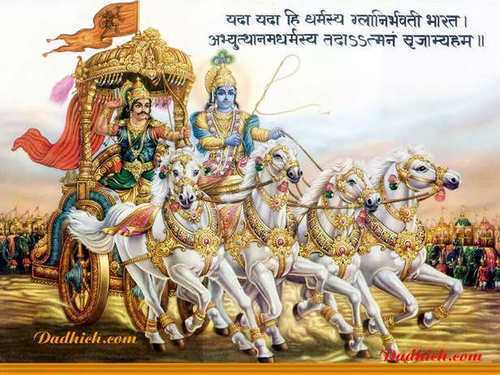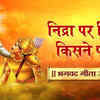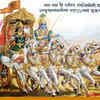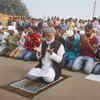Where Arjuna Questions and Muhammad Listens: Bhagavad Gita vs. Quran

In the vast expanse of time and spirituality, two extraordinary figures meet in an imagined space where boundaries between cultures, eras, and faiths dissolve. Arjuna, the warrior prince from the
Bhagavad Gita, and Prophet Muhammad, the messenger of the
Quran, find themselves in a unique dialogue. While their respective scriptures arise from different traditions, they share strikingly similar teachings on faith, duty, morality, and divine purpose. Through this conversation, we delve into how the
Bhagavad Gita and the
Quran reflect common ideologies that transcend time and geography, offering timeless wisdom to humanity.
The Question of Duty
 Arjuna:
"O revered Muhammad, I stand paralyzed on the battlefield of Kurukshetra. My heart trembles at the thought of raising arms against my own kin. How can I fulfill my duty when it feels so laden with sorrow?"
Muhammad:
"O Arjuna, duty often requires us to act beyond personal desires or attachments. Allah says in the Quran, 'Stand firm in justice, even against yourselves or your relatives.' When the cause is righteous, you must act with conviction, for justice is the essence of faith."
Krishna:
"Arjuna, I have told you that inaction is worse than misguided action. Perform your duty as a warrior without attachment to the results. This selfless action is the path of Karma Yoga, which leads to liberation."
Arjuna:
"But how can one act without attachment? Is it not human to desire outcomes?"
Muhammad:
"Indeed, it is natural, but Allah teaches us to act for His sake alone, not for worldly gains. The Quran reminds us, 'To Allah belongs the outcome of all efforts.' Trust Him, for He is the ultimate guide."
Krishna:
"Exactly so. Attachment to the fruits of actions binds the soul to the cycle of birth and death. Let go of this attachment, and focus only on the righteousness of your deeds."
Arjuna:
"O revered Muhammad, I stand paralyzed on the battlefield of Kurukshetra. My heart trembles at the thought of raising arms against my own kin. How can I fulfill my duty when it feels so laden with sorrow?"
Muhammad:
"O Arjuna, duty often requires us to act beyond personal desires or attachments. Allah says in the Quran, 'Stand firm in justice, even against yourselves or your relatives.' When the cause is righteous, you must act with conviction, for justice is the essence of faith."
Krishna:
"Arjuna, I have told you that inaction is worse than misguided action. Perform your duty as a warrior without attachment to the results. This selfless action is the path of Karma Yoga, which leads to liberation."
Arjuna:
"But how can one act without attachment? Is it not human to desire outcomes?"
Muhammad:
"Indeed, it is natural, but Allah teaches us to act for His sake alone, not for worldly gains. The Quran reminds us, 'To Allah belongs the outcome of all efforts.' Trust Him, for He is the ultimate guide."
Krishna:
"Exactly so. Attachment to the fruits of actions binds the soul to the cycle of birth and death. Let go of this attachment, and focus only on the righteousness of your deeds."
The Nature of the Divine
 Arjuna:
"Krishna, you have shown me your universal form, a vision of the divine essence in all creation. Muhammad, how does Allah reveal Himself in your teachings?"
Muhammad:
"Allah is the eternal, omnipotent Creator, incomparable and beyond form. He reveals Himself through His signs in nature and the Quran. It is said, 'He is closer to you than your jugular vein.' Allah’s presence is felt, not seen."
Krishna:
"And yet, the essence remains the same. The divine is infinite, unbound by human comprehension. I revealed my cosmic form to you, Arjuna, so you might understand that all existence is interconnected and arises from the divine."
Arjuna:
"It seems both teachings ask us to surrender. But what does surrender truly mean?"
Muhammad:
"Surrender means submitting fully to Allah’s will, trusting Him entirely. This is the essence of Islam, to find peace in submission."
Krishna:
"And in the Gita, surrender is devotion, offering all actions and desires to the divine without selfish intent. It is through this surrender that the soul attains freedom."
Faith, Fear, and Resilience
Arjuna:
"Krishna, you have shown me your universal form, a vision of the divine essence in all creation. Muhammad, how does Allah reveal Himself in your teachings?"
Muhammad:
"Allah is the eternal, omnipotent Creator, incomparable and beyond form. He reveals Himself through His signs in nature and the Quran. It is said, 'He is closer to you than your jugular vein.' Allah’s presence is felt, not seen."
Krishna:
"And yet, the essence remains the same. The divine is infinite, unbound by human comprehension. I revealed my cosmic form to you, Arjuna, so you might understand that all existence is interconnected and arises from the divine."
Arjuna:
"It seems both teachings ask us to surrender. But what does surrender truly mean?"
Muhammad:
"Surrender means submitting fully to Allah’s will, trusting Him entirely. This is the essence of Islam, to find peace in submission."
Krishna:
"And in the Gita, surrender is devotion, offering all actions and desires to the divine without selfish intent. It is through this surrender that the soul attains freedom."
Faith, Fear, and Resilience Arjuna:
"Fear and doubt often cloud my mind. What if I fail in my duties? How do I overcome this weakness?"
Muhammad:
"Allah reassures us in the Quran, 'Do not despair of His mercy. Indeed, Allah forgives all sins.' Faith is your armor. Seek His guidance, and even failure becomes a step toward growth."
Krishna:
"Arjuna, I have told you that the soul is eternal and indestructible. Fear and failure belong to the material world, not the spirit. Rise above these illusions and focus on your dharma (duty)."
Muhammad:
"And know this: with hardship comes ease. Patience and prayer are the keys to resilience. Trust in Allah, and He will strengthen you."
Krishna:
"Yes, patience is a virtue. The wise remain unshaken by success or failure, for their faith lies in the divine, not in worldly outcomes."
Arjuna:
"Fear and doubt often cloud my mind. What if I fail in my duties? How do I overcome this weakness?"
Muhammad:
"Allah reassures us in the Quran, 'Do not despair of His mercy. Indeed, Allah forgives all sins.' Faith is your armor. Seek His guidance, and even failure becomes a step toward growth."
Krishna:
"Arjuna, I have told you that the soul is eternal and indestructible. Fear and failure belong to the material world, not the spirit. Rise above these illusions and focus on your dharma (duty)."
Muhammad:
"And know this: with hardship comes ease. Patience and prayer are the keys to resilience. Trust in Allah, and He will strengthen you."
Krishna:
"Yes, patience is a virtue. The wise remain unshaken by success or failure, for their faith lies in the divine, not in worldly outcomes."
Purpose and Accountability
 Arjuna:
"What is the ultimate purpose of life? Is it salvation, self-realization, or something else?"
Krishna:
"The ultimate goal is liberation (moksha)—freedom from the cycle of birth and death. This is achieved through self-realization and devotion. Live selflessly, and you will find eternal peace."
Muhammad:
"The Quran teaches us that life’s purpose is to worship Allah and follow His guidance. True success lies in attaining paradise (Jannah), which is the reward for faith and righteous deeds."
Arjuna:
"And how are we held accountable for our actions?"
Muhammad:
"Allah says, 'Whoever does an atom’s weight of good will see it, and whoever does an atom’s weight of evil will see it.' Every soul will face judgment for its deeds."
Krishna:
"The law of karma governs all. Good deeds lead to spiritual progress, while selfish acts bind the soul to suffering. Accountability is the thread that connects actions to their consequences."
Arjuna:
"What is the ultimate purpose of life? Is it salvation, self-realization, or something else?"
Krishna:
"The ultimate goal is liberation (moksha)—freedom from the cycle of birth and death. This is achieved through self-realization and devotion. Live selflessly, and you will find eternal peace."
Muhammad:
"The Quran teaches us that life’s purpose is to worship Allah and follow His guidance. True success lies in attaining paradise (Jannah), which is the reward for faith and righteous deeds."
Arjuna:
"And how are we held accountable for our actions?"
Muhammad:
"Allah says, 'Whoever does an atom’s weight of good will see it, and whoever does an atom’s weight of evil will see it.' Every soul will face judgment for its deeds."
Krishna:
"The law of karma governs all. Good deeds lead to spiritual progress, while selfish acts bind the soul to suffering. Accountability is the thread that connects actions to their consequences."
Unity in Love and Devotion
 Arjuna:
"Both of you speak of love and devotion. Is this the ultimate path to truth?"
Krishna:
"Yes, devotion (bhakti) transcends all. Offer your heart to the divine, and you shall find liberation."
Muhammad:
"Indeed, love for Allah is the essence of faith. The Quran says, 'Remember Me, and I will remember you.' Through devotion, prayer, and gratitude, the soul finds peace."
Arjuna:
"Both of you speak of love and devotion. Is this the ultimate path to truth?"
Krishna:
"Yes, devotion (bhakti) transcends all. Offer your heart to the divine, and you shall find liberation."
Muhammad:
"Indeed, love for Allah is the essence of faith. The Quran says, 'Remember Me, and I will remember you.' Through devotion, prayer, and gratitude, the soul finds peace."
Parting Words of Wisdom

As their conversation draws to a close, Arjuna reflects on the harmony in their teachings.
Arjuna:
"Despite our different traditions, your words echo the same truth. Krishna, you teach me selflessness. Muhammad, you remind me of submission. Together, you have shown me that faith, duty, and devotion are universal."
Muhammad:
"Righteousness unites all sincere seekers, no matter the path they follow. May you act with faith and courage, Arjuna."
Krishna:
"Rise, Arjuna, and fulfill your destiny. Remember, the divine is with you always."
With these words, Arjuna bows, his doubts dissolved. He returns to the battlefield, not as a warrior of conflict but as a seeker of truth, guided by the timeless wisdom of two great traditions.
This imagined dialogue highlights the shared principles in the
Bhagavad Gita and the
Quran, revealing how their teachings converge to guide humanity toward faith, resilience, and purpose. Through this creative interplay, the universality of spiritual truths shines brightly, transcending divisions and inspiring unity.
 In the vast expanse of time and spirituality, two extraordinary figures meet in an imagined space where boundaries between cultures, eras, and faiths dissolve. Arjuna, the warrior prince from the
Bhagavad Gita, and Prophet Muhammad, the messenger of the
Quran, find themselves in a unique dialogue. While their respective scriptures arise from different traditions, they share strikingly similar teachings on faith, duty, morality, and divine purpose. Through this conversation, we delve into how the
Bhagavad Gita and the
Quran reflect common ideologies that transcend time and geography, offering timeless wisdom to humanity.
In the vast expanse of time and spirituality, two extraordinary figures meet in an imagined space where boundaries between cultures, eras, and faiths dissolve. Arjuna, the warrior prince from the
Bhagavad Gita, and Prophet Muhammad, the messenger of the
Quran, find themselves in a unique dialogue. While their respective scriptures arise from different traditions, they share strikingly similar teachings on faith, duty, morality, and divine purpose. Through this conversation, we delve into how the
Bhagavad Gita and the
Quran reflect common ideologies that transcend time and geography, offering timeless wisdom to humanity.


 Arjuna:
"Fear and doubt often cloud my mind. What if I fail in my duties? How do I overcome this weakness?"
Arjuna:
"Fear and doubt often cloud my mind. What if I fail in my duties? How do I overcome this weakness?"


